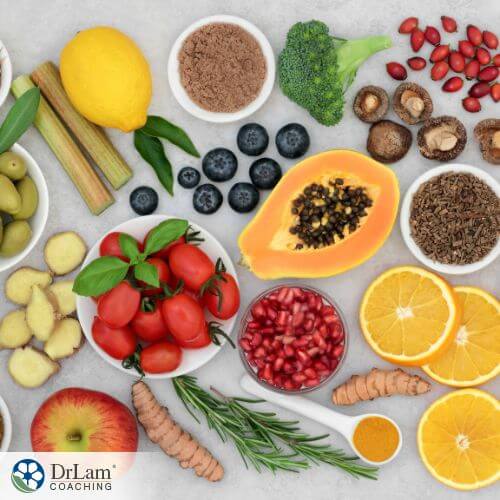Flavan-3-ols are a dietary bioactive compound that has recently started to receive more attention, with organizations such as the Academy of Nutrition and Dietetics releasing dietary guidelines for these compounds. This article explores exactly what they are, where you can find them, and their potential health benefits.
 Flavan-3-ols are a subclass of flavonoids that is part of the polyphenol family. Polyphenols are compounds typically found in plant products. Whilst vitamins and minerals are essential for survival, polyphenols are not; however, they may be health-promoting.
Flavan-3-ols are a subclass of flavonoids that is part of the polyphenol family. Polyphenols are compounds typically found in plant products. Whilst vitamins and minerals are essential for survival, polyphenols are not; however, they may be health-promoting.
Within the class of flavan-3-ols, there are a range of different compounds which include:
There are many different sources of flavan-3-ols, which can make it easy to increase your flavan-3-ol intake. Some sources high in flavan-3-ols and their corresponding levels and portion sizes are:
It's recommended that to receive the flavan-3-ols benefits, 400 to 600 milligrams are required daily.
Flavan-3-ols are considered a natural source of antioxidants, compounds that help to neutralize free radicals. Free radicals are unstable molecules that are produced in response to illness, stress, and pollutants. These free radicals can cause cellular damage, increase inflammation, and worsen illnesses. Antioxidants neutralize these unstable molecules and can prevent and reduce damage to the cells. This can help to reduce inflammation and assist in the recovery from illnesses (1).
The antioxidant properties help to reduce inflammation. However, there are other mechanisms in which flavan-3-ols help to reduce inflammation in the body. In infection, immune cells known as macrophages produce various factors to address the infection. These factors are nitric oxide (NO) and various interleukins. Research suggests that flavan-3-ols can inhibit the release of these factors, helping to reduce inflammation. Catechins can inhibit the production of NO as well as tumor necrosis factor (an inflammatory cytokine), whilst epicatechins can also inhibit tumor necrosis factor (1).
There are many factors that may lead to cancer. However, one of the factors that it is related to is apoptosis, the death of a cell. This is a natural process that is followed by the growth of new cells. However in some cases, if this pathway is blocked or damaged, cells can start to divide uncontrollably, and this can result in the growth of a tumor.
One study found that epigallocatechin-3-gallate, one of the flavan-3-ols, had a significant effect on inducing apoptosis and regulating the cell cycle. This may help to play a role in reducing the occurrence of cancer. This form of flavanol is found naturally, and is particularly high in green tea (2).
Another factor that may be involved in the occurrence of cancer is a compound called TPA. This compound is a potent tumor promoter. Oligomeric flavan-3-ols may help to inhibit the production of this compound, thus reducing the occurrence of tumors.
Epicatechins and theaflavins may help to protect and fight against viruses. Studies found that epicatechins, specifically epigallocatechin-3-gallate, can help to inhibit viruses such as hepatitis C, human immunodeficiency virus (HIV), and West Nile virus. Theaflavins have been found to protect against hepatitis C and tobacco mosaic virus. Additionally, studies suggest that these two flavan-3-ols may be protective against the COVID-19 virus (1).
 One marker for cardiovascular disease is your cholesterol levels. Within cholesterol levels, there is high-density lipoprotein (HDL) cholesterol and low-density lipoprotein (LDL) cholesterol. The HDL cholesterol can absorb cholesterol and carry it to your liver. However, LDL cholesterol transports cholesterol in your body. This can cause LDL cholesterol to start to build up in your arteries, making them more narrow. This cholesterol is also prone to oxidization, which can increase inflammation. This can eventually cause the artery to become completely or partially blocked and can result in a stroke or heart attack.
One marker for cardiovascular disease is your cholesterol levels. Within cholesterol levels, there is high-density lipoprotein (HDL) cholesterol and low-density lipoprotein (LDL) cholesterol. The HDL cholesterol can absorb cholesterol and carry it to your liver. However, LDL cholesterol transports cholesterol in your body. This can cause LDL cholesterol to start to build up in your arteries, making them more narrow. This cholesterol is also prone to oxidization, which can increase inflammation. This can eventually cause the artery to become completely or partially blocked and can result in a stroke or heart attack.
Maintaining low levels of LDL cholesterol and high levels of HDL cholesterol is an important aspect of heart health and preventing heart disease. Exercise as well as a healthy diet can help to maintain your cholesterol levels within an optimal range. Research suggests that flavan-3-ols may also assist in optimizing these levels by preventing oxidation as well as helping to reduce cholesterol levels.
Another factor that can cause heart disease is angiotensin I-converting enzyme (ACE). There are many roles of ACE. However, one of these roles is that it can increase blood pressure, increasing the risk for heart disease. One study found that epigallocatechin-3-gallate, oligomeric flavan-3-0ls, and intestinal bacteria can help to have an inhibitory effect on ACE, helping to protect against heart disease.
Diabetes is a condition that affects your blood sugar levels. Type 2 diabetes is one of the types of diabetes that can occur and is also known as a lifestyle condition as an unhealthy lifestyle such as lack of exercise and poor nutrition can cause it.
Whilst exercising and optimal nutrition are key in lowering the risk of diabetes, flavan-3-ols may assist. Flavan-3-ols, as well as broken-down compounds of flavan-3-ols in the colon, may help to assist with the metabolism of glucose.
They do this through the modulation of many different mechanisms that are involved in the occurrence of diabetes. These include:
Being overweight or obese can result in many different conditions such as insulin resistance, diabetes, and heart disease. This makes it important to maintain a healthy weight.
Studies researching the effects of flavan-3-ols, specifically the ones in green tea, found that it may help to support a healthy weight. This is done by the following mechanisms:
Gut health is an incredibly important aspect of health and affects your digestion, immune system, weight, and mental health. Your gut health is determined by various factors including the composition of bacteria within it. For a healthy gut, in simple terms, there should be a higher ratio of beneficial bacteria to harmful bacteria. However, with stress, conventional medications, and poor nutrition, this ratio can shift where there is a higher ratio of harmful bacteria to beneficial bacteria.
There are many ways in which to improve gut health, with studies suggesting that flavan-3-ols may play a crucial role. Flavan-3-ols, specifically in chocolate, green tea, black currants, and grape seed extracts, may help to positively affect the microbiome. Research has found that these flavan-3-ols increase the concentration of beneficial bacteria such as the lactobacillus species. However, they may inhibit other beneficial species of bacteria within the gut. Another study found that the flavan-3-ols available in red wine increased multiple species of beneficial bacteria, and one study focusing on the flavan-3-ols available in tea found that it helped to inhibit the growth of pathogenic bacteria (4).
 Stress has many effects on the body, and one of the effects of chronic stress is the occurrence of Adrenal Fatigue Syndrome (AFS). The NeuroEndoMetabolic (NEM) Stress Response System is a system of six circuits or related organ systems that help to support your body in response to stress, specifically short-term stress. When stress becomes long-term, imbalances within these circuits can start to occur and AFS can begin. AFS is the non-Addison's form of adrenal dysfunction, where the body's stress response cannot keep up with life's chronic stressors.
Stress has many effects on the body, and one of the effects of chronic stress is the occurrence of Adrenal Fatigue Syndrome (AFS). The NeuroEndoMetabolic (NEM) Stress Response System is a system of six circuits or related organ systems that help to support your body in response to stress, specifically short-term stress. When stress becomes long-term, imbalances within these circuits can start to occur and AFS can begin. AFS is the non-Addison's form of adrenal dysfunction, where the body's stress response cannot keep up with life's chronic stressors.
Symptoms of AFS will depend on where the imbalance in the NEM system is occurring. One of the circuits within the NEM system that can be affected is the Bioenergetics circuit. This circuit consists of the pancreas, thyroid, and liver and helps to regulate your metabolism as well as blood sugar levels. Imbalances within this circuit can result in changes in your metabolism and sugar levels and can result in the following symptoms:
The use of flavan-3-ols may help to alleviate some of these symptoms by helping with weight maintenance as well as helping to regulate sugar levels.
The main way of increasing your intake of flavan-3-ols is through dietary sources. One general rule of thumb is to make sure that your plate is colorful with fruits and vegetables. This will ensure a variety of foods, nutrients, and flavan-3-ols.
If you are concerned that you will not be able to get your daily recommendation of flavan-3-ols through food, supplements are available. These supplements contain either a single or combination of flavan-3-ols. Whilst this can help you to increase your intake of flavan-3-ols, there are other benefits of dietary sources of flavan-3-ols, such as fiber, that are not available through supplements.
Whilst the intake of flavan-3-ols is important to ensure that you receive them, bioavailability is also a consideration. Several factors can influence the bioavailability of flavan-3-ols. One of these factors is your gut.
In the gut, the flavan-3-ols are digested into metabolites. Research suggests that the bioavailability of these flavan-3-ols is dependent on the metabolites. The gut microbiome is responsible for this. A healthy gut will digest the flavan-3-ols into metabolites, but an unhealthy gut may not be able to digest these compounds efficiently, thus decreasing their bioavailability. Therefore a healthy gut is important.
There are various factors that can help to improve gut health such as exercise and a diet low in refined carbohydrates and added sugars but high in unrefined carbohydrates and fiber. Probiotics and fermented foods may also help.
Whilst flavan-3-ols are not essential nutrients, they do carry a number of different health benefits such as:
These benefits can help to enhance your health and prevent health conditions. Recommendations for these plant compounds have been lacking. However, the current recommendation is 400-600mg per day.
If you have been struggling with changes in your weight or have been experiencing changes in your blood sugar levels and think it could be a result of stress, the Dr. Lam team can assist. You can call us directly at +1 (626) 571-1234 or click here for a free initial call.
Luo, Y., et al. "Flavanols from Nature: A Phytochemistry and Biological Activity Review." Molecules, vol. 27, no. 3, 2022 Feb, pp. 719, doi:10.3390/molecules27030719.
Campos, E.M., et al. "Antidiabetic Effects of Flavan-3-ols and Their Microbial Metabolites." Nutrients, vol. 12, no. 6, 2020 Jun, pp. 1592, doi:10.3390/nu12061592.
Bertoia, M.L., et al. "Dietary Flavonoid Intake and Weight Maintenance: Three Prospective Cohorts of 124,086 US Men and Women Followed up for 24 Years." BMJ, vol. 352, 2016, doi:10.1136/bmj.i17.
Cardona, F., et al. "Benefits of Polyphenols on Gut Microbiota and Implications in Human Health." Journal of Nutritional Biochemistry, vol. 24, no. 8, 2013 Aug, pp. 1415-1422, doi:10.1016/j.jnutbio.2013.05.001.
Individuals currently experiencing AFS can receive the benefits of flavan-3-ols. It is however important to be mindful that during AFS, the body can become very sensitive. This makes it important to choose food sources that are good quality and free of toxins.
